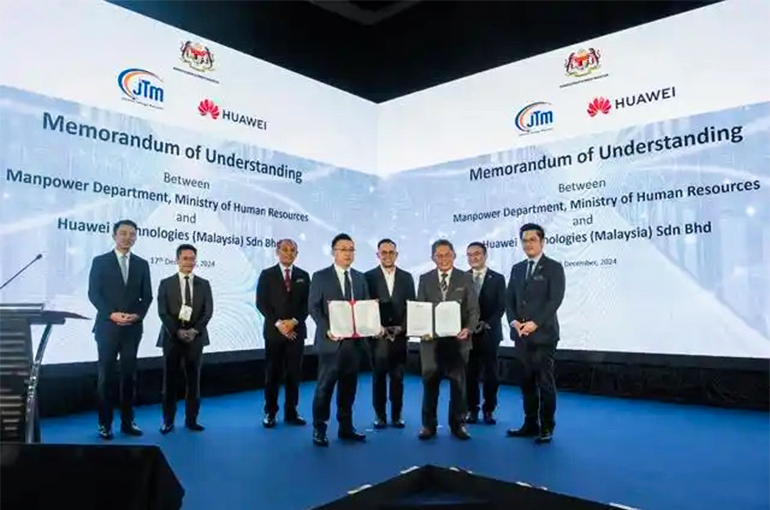 Huawei to Train More Talent for Malaysia’s Emerging Industries
Huawei to Train More Talent for Malaysia’s Emerging Industries(Yicai) Dec. 27 -- China’s Huawei Technologies is deepening its collaboration with Malaysia by launching technical and vocational training programs aimed at nurturing professionals for emerging industries in the Southeast Asian nation.
Huawei signed an agreement with Malaysia’s Ministry of Human Resources at the recent Malaysia-China Summit 2024 in Kuala Lumpur to launch technical and vocational education and training programs, the Shenzhen-based company announced last week.
Under the deal, a TVET Huawei Learning Centre will be set up at Institut Latihan Perindustrian Kuala Lumpur to provide Huawei-certified courses on advanced technologies such as artificial intelligence, fifth-generation networks, cloud computing, big data, transmission, and the Internet of Things.
The first cohort of 2,000 trainees, which will include engineers, new employees, and teachers, will gain theoretical knowledge and hands-on experience on Huawei equipment to boost their competitiveness in the jobs market and open pathways to high-value roles in the information and communication technology sector.
The goal of the TVET program is to leverage Huawei's leading expertise in ICT to enhance Malaysians' mastery of 5G networks and cutting-edge tech while enhancing TVET capabilities across the country, Human Resources Minister Steven Sim Chee Keong said at the signing ceremony.
The country is one of Huawei’s key global markets for business operations and development, noted Huawei Malaysia Chief Executive Sun LuYuan. Huawei has trained a significant number of high-level professionals locally over the past few years, with 80 percent of Huawei's local workforce now comprising Malaysians, Sun added.
Huawei has been committed to developing technical talent in Malaysia since setting up a representative office there in 2001, the company told Yicai. Over the last five years, it has partnered with 42 local colleges to set up ICT academies and train more than 50,000 ICT professionals, it said.
This March, Huawei partnered with the Malaysian Communications and Multimedia Commission under the Ministry of Communications to train 300 elite digital leaders from the government, industry, and universities over a three-year period. So far, 50 participants have graduated from the program, which covers 5G, AI, cloud computing, and big data.
Huawei’s talent development efforts in Malaysia already have a strong foundation, and the newly signed project will broaden the beneficiary base, Guo Rujing, senior public relations manager at Huawei Malaysia, told Yicai.
“Huawei has established a local pyramid-shaped talent development system, covering elite leaders, industry partners, and university faculty and students,” he said. “Now, it is extending to technical and vocational talent.”
After more than 20 years of development, Huawei now has over 4,000 employees in Malaysia and operates multiple branches, including the country unit, its Asia-Pacific headquarters, and a global training center.
Editors: Dou Shicong, Martin Kadiev